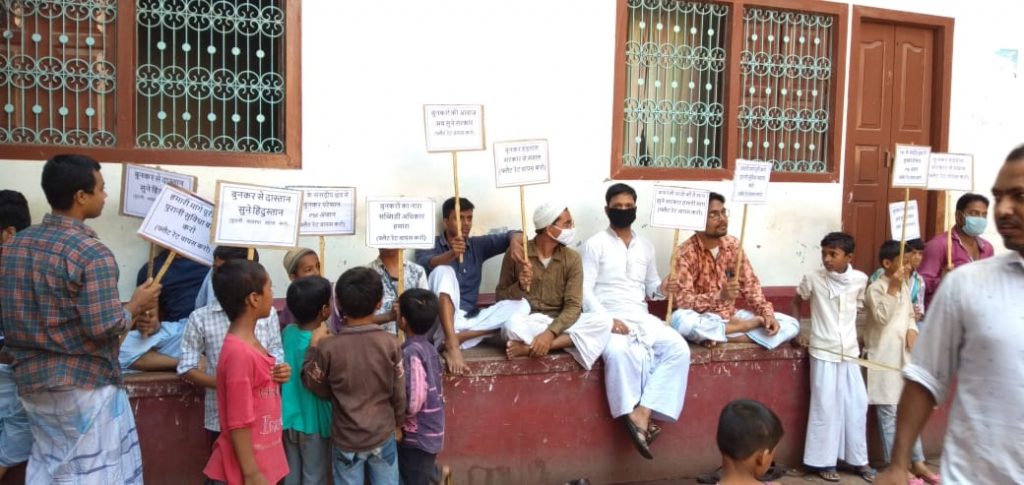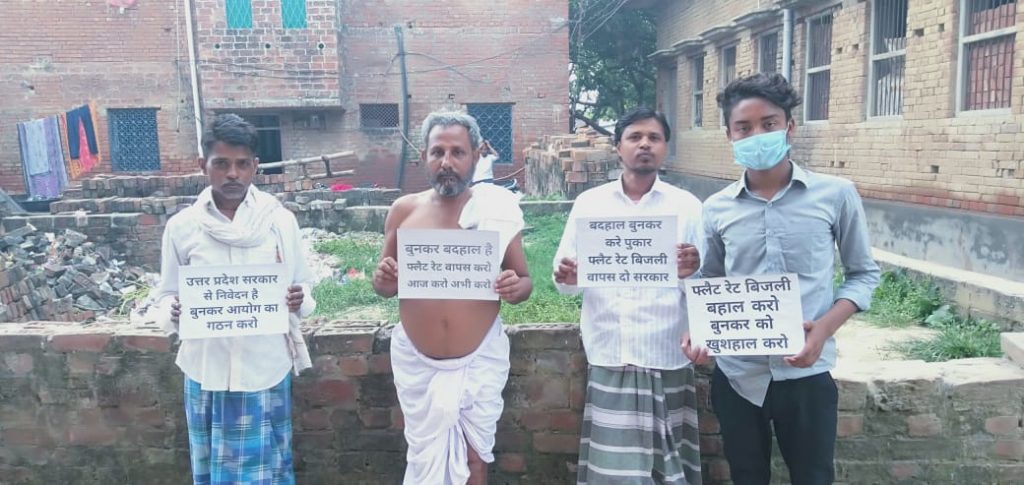By Musheera Ashraf, TwoCircles.net
Uttar Pradesh: “While the country is struggling to fight the pandemic, the Uttar Pradesh government seems to have unleashed a war against the weavers,” says Manish, who is a social activist and a member of Bunkar Sajha Manch.
The weavers of the region have come under the banner of “Bunkar Saajha Manch” to fight unitedly for weaver’s rights. This includes all the bunkars from Gorakhpur, Azamgarh, Devariya, Banaras and Mau.
The power loom sector occupies a pivotal position in the Indian textile industry. The Indian textile industry contributes significantly to the Indian economy. It is the second-largest employer after the Agriculture sector in India and is considered largest in the world with a massive raw material and textiles manufacturing base. It employs around 60 million people in textile manufacturing activities. The India Textile Industry has three main segments which include the mill sector, handloom sector and decentralized power loom sector.
The power loom weavers in Uttar Pradesh went on a strike on September 1 in protest against the new power tariff imposed on them.
They demanded the old tariff system be restored calling their strike as an ultimatum to the government. “If they don’t listen to our demands then we will come on roads and protest,” said a power loom weaver who resides in Azamgarh.

“Weaver community is on the verge of starvation. They are ready to fight or die for their rights,” he said.
According to the weavers, the new tariff will increase the cost of production and force them to lose business. The state government used to take a fixed charge for electricity earlier, but the government has now replaced it with a new tariff. “The U.P government was taking Rs 72 per power loom as electricity charge but as per the new tariff, the bill would be around 3000 Rs per loom,” says Manish.
The flat rate per machine that was fixed by the government has been dissolved.
The new power tariff and the pandemic-induced lockdown have deepened the weaver’s crisis. Several skilled weavers have been forced to look for alternative livelihoods to make ends meet.
Speaking with TwoCircles.net, Manish talked about the deteriorating condition of the weaver community.
“Everyone is moving towards the unlock phase, but the weavers are still under lockdown,” he said.

“It seems the government wants to crush these weaver’s and attack their occupation while the corporations will be benefitted,” he added.
Another powerloom weaver in Mau, Saadat said that, “instead of providing the weavers with relief, the government is trying to snatch whatever they are left with.”
“We are already hard hit by the lack of demand and this step brings out the intention of the government to attack these small businesses,” he said.
The Ministry of Textile used to give the charges to the electricity department, but for the last four years, the textile ministry is not paying the electricity department. Now the electricity department has started sending the bill to the weavers.
“This came as a shock and mental trauma for the community,” says Saadat.
“I got a message to pay 80,000 to the electricity department,” says Noorul Haq who has been a weaver in Banaras since decades.
“Many of our people received messages to pay the due and the amount was in lakhs,” he adds.
“Does the government want us to beg and pay them?” Noorul Haq questions.
The power loom sector is of more recent vintage and has shown enormous growth, especially in Uttar Pradesh. At present, handloom and powerloom industries are existing side by side. The handloom market has now become limited and the domain of few handloom owners, however, the powerloom sector provides livelihood to millions.
The weavers complain that the irresponsible step of the government in the times of corona has not only shaken their financial setup but impacted their mental health as well.
“This unit wise payment was decided in December 2019 but it was pending due to the outrage of the weavers. As the unlock phase started people started to get notices regarding the bill payment,” says Saadat.
Manish said that the situation of weavers deteriorated to the point that they even started selling their personal belongings to fulfil their needs.
“Their children are in a situation where they are selling tea and have started selling things at the roadside to meet the scarcity of proper food and living conditions,” he added.
The demand of Banarasi saree used to be seen throughout India but now there is no demand due to lockdown. “Cloth is not the priority for the people in these times,” says Ahsan, a weaver from Banaras.
Another weaver from Banaras, Alam said that, “After the meeting with the delegation of the weaver’s on September 3, the government has promised us that they will dismiss all the dues till July.”
“We have called off the strike for now but if we didn’t get anything in written till Monday we will resume it again,” says Manish.
According to the weavers, the government has asked them to wait for 10 to 15 days. Though they have dismissed the due till July they are not talking about the fixed electricity rate.

The agitation has been called off but the weavers want their demands to be fulfilled at the earliest. Noorul Haq says, “We have been suffering since long, looms are closed, demand is less and we are facing an existential crisis.”
Echoing similar sentiments, every weaver wants the electricity at subsidised rates. “This is our simple and only demand” they add.
“We are ready to resume our strike if our demands go unheard,” says Manish. “Weaving is not just an occupation but a livelihood and it is intertwined with the culture of people” he adds.
Bunkar Sajha Manch collectively opines “Bijli toh bahana hai, asal mai bunkaro ko mitana hai (Electricity is just an excuse. They want to finish Bunkar’s).” Weaver’s have decided to gather in their mohallas and will put forward their demands once again on 30 September.
The weavers vow to intensify the stir if the government does not implement these demands.


